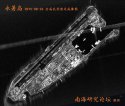You are using an out of date browser. It may not display this or other websites correctly.
You should upgrade or use an alternative browser.
You should upgrade or use an alternative browser.
PLAN SCS Bases/Islands/Vessels (Not a Strategy Page)
- Thread starter lilzz
- Start date
plawolf
Lieutenant General
I would say they also provide the ability to monitor underwater traffic as well.
True, if Chinese also constructs large underwater hydrophone arrays. But as I understand it, the PLAN has deep reservations about such arrays.
Those concerns could largely be summed up as usefulness and cost.
When the US and NATO faced off against the USSR, they enjoyed massive geographical advantages.
The Soviet navy were largely bottleneck by geography, and there are certain places their ships and subs pretty much had a pass in order to break out into the Atlantic and Pacific.
As such, the US was able to focus their efforts in those natural choke points, and build hydrophone arrays pretty much directly under the route Soviet subs were forced to take, therefore given them the best results possible.
The USN faces no such constraint, so the Chinese would have to build a network orders of magnitude larger to achieve similar results. The costs of such a comprehensive network will be quite phenomenal.
The other major problem with hydrophone arrays is that they are static, and takes considerable time to build, as such any opponent you might need such arrays for would know where they are being built. If you don't build a comprehensive network that covers everywhere, the enemy could easily skirt round your coverage.
In addition, the static and undefendable nature of these arrays, they are easy targets for opponents and enemies to manipulate/sabotage.
At the crudest level, it would not be hard for a top power to place remote controlled explosive charges at key points along the network that would allow them to cripple or even effectively destroy it with the flick of a switch at the onset of open hostilities.
If they were to be a little cute, they would also install bugs (thereby effectively commandeering your hydrophone array to work for them by allowing them to use it to record the signatures of your own subs) and/or tempering devices. Like say a shunt, that allows them to effectively shut off part of the array without you knowing about it.
Then they could sneak assets through from where you least expect them and hit you while you are busy watching elsewhere.
Those are just the general problems with hydrophone arrays, to deploy them in the SCS around the Chinese constructed islands also carry additional specific problems.
The chief one being again geography. The waters around those islands are very shallow, so no decent sub skipper would want his boat anywhere near them anyways. Shallow waters are also inherently much more noisy with wildlife and surface noises. So the usefulness of underwater listen assets around those islands are going to be highly questionable.
The shallow waters also makes sabotage and manipulation much easier to carry out and harder to detect.
The legal status of the islands, specifically the fact that they cannot claim 12nm territorial waters around them means there is precious little the Chinese could do about it even if they catch someone tempering with their underwater listening arrays.
Based on all of this, I do not think China will make any serious effort to establish comprehensive underwater monitoring outposts on those islands.
Blackstone
Brigadier
Another important piece in China's undeclared Monroe Doctrine.A more recent photo of Yongshu (Fiery Cross) Island dated 26-Aug-2015.
This one has better resolution compared to the previous one. Enjoy!
With the number of buildings on the island, it looks like a small town.
View attachment 17833
joshuatree
Captain
Latest set of pics of Subi.








Equation
Lieutenant General
Monroe Doctrine requires colonization of native land and native blood spilling. Don't see any natives here on these Chinese man made island.Another important piece in China's undeclared Monroe Doctrine.
Holy mother of sweet baby Jesus! Look at the tetrapods lining up the shorelines along solid caissons forming a massive breakwater on those islands - Subi, Meiji etc. Barring 30-foot tsunami, these can protect the shorelines for many centuries. We are probably looking at a few billion dollars for those structures and constructions still going on there. China's industrial might is really impressive.
The Monroe Doctrine required no such thing my friend.Monroe Doctrine requires colonization of native land and native blood spilling. Don't see any natives here on these Chinese man made island.
The Monroe Doctrine, as developed from President Monroe's address to congress, indicated that the United States would view any further efforts by European nations to colonize land, or interfere with states in North or South America as acts of aggression.
His actual statement was:
Monroe said:“The American continents are henceforth not to be considered as subjects for future colonization by any European powers.”
Surely only person expected sand castles?Holy mother of sweet baby Jesus! Look at the tetrapods lining up the shorelines along solid caissons forming a massive breakwater on those islands - Subi, Meiji etc. Barring 30-foot tsunami, these can protect the shorelines for many centuries. We are probably looking at a few billion dollars for those structures and constructions still going on there. China's industrial might is really impressive.







